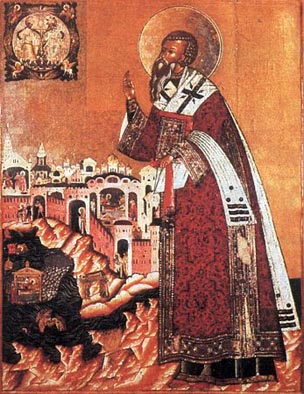
The PriestMartyr Clement, Pope of Rome
Commemorated on November 25 (November 24 by Greek Calendar)
The PriestMartyr Clement, Pope of
Rome,
was born at Rome into a rich and illustrious family. Since childhood separated
from his parents by force of circumstances, Clement was raised by strangers.
Living at Rome, the youth received a fine education, he was surrounded by
luxury, and had access to the imperial court. But the comforts brought him no
delight, and the pagan wisdom failed to attract him. He began to think about
the meaning of life. When the news about Christ and His teaching began to reach
the capital, Saint Clement left his home and estate and set out to those lands,
where the Apostles were preaching. At Alexandria Saint Clement encountered the
holy Disciple Barnabas, hearkening to his words with deep attention, and with
all his heart perceiving the power and truth of the Word of God. Arriving in
Palestine, Saint Clement accepted Baptism from the holy Apostle Peter and
became his zealous student and constant companion, sharing with him his toil
and sufferings. The holy Apostle Peter shortly before his own sufferings and
death ordained Saint Clement to become a bishop of the city of Rome. After the
death of the Apostle Peter, there followed next as Bishop of Rome Saint Linus
(67-79), succeeded by Saint Anacletus (79-91), and then upon the Roman
cathethra-see came next Saint Clement (92-101).
The virtuous life, charitable works
and prayerful activity of holy Pope Clement converted many to Christ. Thus, on
the day of Pascha once he baptised 424 people. And among the baptised were
people of all social classes: slaves, officials, members of he imperial family.
The pagans, seeing the success of
his apostolic preaching, made denunciations against Saint Clement to the
emperor Trajan (98-117), accusing the saint of insulting the pagan gods. The
emperor banished Saint Clement from the capital, sending him off to the faraway
Crimea, for work at the Inkerman stone quarry not far from the city of Kherson.
Many of the disciples of the saint followed after him, voluntarily preferring
exile rather than separation from their spiritual father. Having arrived at the
place of exile, Saint Clement found there many Christian believers, sentenced
to toil under harsh conditions, and amidst a scarcity of water. He prayed
together with the condemned, and the Lord in the image of the Lamb revealed to
him the place of a spring of water, from which gushed forth a veritable river
of water. This miracle attracted to Saint Clement a multitude of people.
Hearing the zealous preacher, hundreds of pagans were converted to Christ. Each
day 500 or more men were baptised. And there, in the stone quarry, was made a
church, in which he served as priest.

The apostolic activity of the saint
aroused the wrath of the emperor Trajan, and he gave orders to drown Saint
Clement. They threw the martyr into the sea with an anchor about his neck. This
occurred in the year 101.
Through the prayers of the saint's
faithful disciples, Cornelius and Fibius together with all the people, the sea
receded, and the people found a not-wrought-by-hand temple ("Angelic
Church") the undecayed body of their pastor. After this, yearly on the day
of the martyr's death of Saint Clement the sea fell back and in its wake for
seven days Christians were able to venerate his holy relics. Only in the IX
Century during the reign of the Constantinople emperor Nicephoros (802-811), by
Divine sufferance, the relics of Saint Clement for 50 years became inaccessible
for veneration. During the time of the emperor Michael and his mother Theodora
(855-867), Kherson was visited by holy Equal-to-the-Apostles Cyril and
Methodius. Having learned about the concealed relics of Saint Clement, they
induced the Kherson bishop George to make a collective service of prayer to the
Lord for the revealing of the relics of the priestmartyr. After the service of
prayer of Saints Cyril and Methodius and the clergy having come with them from
Tsargrad and the fervent prayer of everyone gathered, on the surface of the sea
at midnight there miraculously appeared the holy relics of Saint Clement. These
they solemnly conveyed to the church of the Holy Apostles [at Constantinople].
A portion of the relics were then transported by Saints Cyril and Methodius to
Rome, but a large portion of the relics was later brought to Kiev by the holy
Equal-to-the-Apostles Vladimir (+ 1015) and placed in the Desyatin-Tithe
church, together with the relics of Saint Fibius, where a chapel in the name of
Saint Clement had been constructed. The memory of the PriestMartyr Clement [in
Russian Kliment] is sacredly venerated in Russia. From ancient times many a
church has been dedicated to him.
Saint Clement, who belongs to the
Apostolic Fathers, has left to us a spiritual legacy – two epistles to the
Corinthians – the first such written memorials of Christian teaching after the
writings of the holy Apostles. They have been published in Russian translation
[and of course also in English]. [trans. note: The significance of the small
group of the generation of the Apostolic Fathers, which includes Saint Clement
Pope of Rome, is in this: they learned the teaching of Christ directly from the
Holy Apostles, who in turn learned directly whilst sitting at the feet of our
Lord. The mark of the "Apostolicity of the Church" refers not only to
the unbroken chain of priestly ordination stretching back to Christ Himself,
but also to our fidelity in the Holy Spirit to the Holy Tradition of the Church
stretching back directly through the Apostles to our Lord Jesus Christ, –
wherein our faith truly is one with "the Church of Christ and His Holy
Apostles"].
© 1996-2001 by translator Fr. S. Janos.